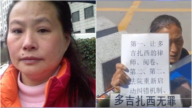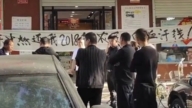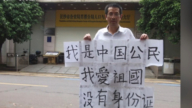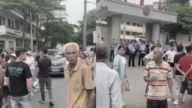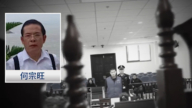【新唐人2013年12月02日讯】中共在十八届三中全会后,高调对外宣布将废除臭名昭著的“劳教制度”。但越来越多的案例揭示,早已存在的所谓黑监狱、洗脑班、法制学习班等,正在成为劳教所的替代品。新近被曝光的一份政府秘密文件,就揭开了这背后的黑幕一角。
11月29号,大陆司法部副部长赵大程在国务院新闻办公室举行的记者会上表示,司法部已经起草了具体实施意见,将积极推进“社区矫正”的立法工作。而在此之前,中共十八届三中全会后,已经决定“废止劳教制度”,用“社区矫正制度”来替代。
据了解,中国的所谓“社区矫正”在2003年创建,2009年开始在全国试点,主要针对的对像是﹕处罚较轻的轻刑犯和短刑犯。
与“劳教制度”一样,中国的“社区矫正制度”一直没有相关法律依据。
时事评论员司马泰:“现在三中全会以后,讨论要搞一个社区矫正法,这样就使得劳教制度废除以后,它的替代品——社区矫正,可以有法律依据,摆脱当年劳教制度的尴尬。”
而大陆司法部副部长还在会上宣称,“社区矫正”绝不会成为“变相劳教”。时事评论员司马泰表示,在西方国家,“社区矫正制度”是针对吸毒、酗酒等被矫正对像的帮助,这些人自己也知道吸毒、酗酒是错的,所以不存在变相处罚的问题。
司马泰:“社区矫正从西方到了中国之后,有一个很大的问题,就是中共把矫正的对像扩大化了。对于良心犯、信仰犯、政治犯,对于这些人它要强迫进行‘教育’的话,就变成了洗脑,就变成了强制‘转化’。所以它很容易就变成劳教。”
司马泰认为,“社区矫正”是否会真的成为“变相劳教”,实际上取决于中共如何对待民众,归根结底还是中国有没有信仰、集会自由的问题,也就是中共一党专制的问题。
长期以来,中共为保政权稳定,对民众进行严厉打压。因此,针对上访人员、思想异议人士的黑监狱、学习班遍布全国各地,而法轮功学员被关进洗脑班、或精神病院等地被迫害的案例,更是比比皆是。
最近,网上曝光的一份政府秘密文件,就揭示了这背后的黑幕一角。
去年,中共十八大前夕,江苏“常熟开关制造有限公司”的维权工人代表胡诚,因为到北京上访,状告企业董事会成员非法侵占股权,而被当局抓进“法制学习班”。
11月15号,胡诚在“新浪微博”上公开了自己的遭遇和几份政府公文。其中“常熟市处理信访突出问题及群体性事件联席会议办公室”的一份文件指称:胡诚在十八大期间“不听劝导,执意进京上访”。将他关进“法制学习班”符合当局的秘密文件——《关于依法处理进京上访人员违法行为若干问题的意见》。
胡诚向江苏省公安厅申请这份秘密文件的信息公开,竟被告知:文件信息属于国家秘密,不予公开。
胡诚对《德国之声》表示,“法制学习班”以秘密文件对公民进行秘密拘押,性质比劳动教养更恶劣。
此外,时事评论员林子旭分析指出,中共废除劳教是迫于外界的压力“不得已而为之”。而废除劳教后,虽然有黑监狱等替代品,但这些迫害形式到目前为止,只能依靠地方财政拨款,缺少像劳教所那样的大量资金支持。
时事评论员林子旭:“没有钱的话,中共这些迫害民众的机构就很难维系。也就是说,虽然中共还会用很多方式继续维持迫害,但是它的迫害力度必然会缩水。”
林子旭强调,目前中国民众的反抗意识已经越来越强,此消彼长之下,中共未来的统治必然会变得越来越困难。
采访/常春 编辑/李谦 后制/李智远
Forced Labor, Community Corrections and “State Secrets”
After the Third Plenary Session of the 18th Central
Committee, the Chinese Communist Party’s (CCP) made
a high-profile announcement that the notorious
“reeducation through labor” system would be abolished.
However, many cases have revealed that the “black jails”,
brainwashing centers and “legal learning centers” that have
long existed have played the same role as labor camps.
Recently exposed secret government documents give
a glimpse of the enormous darkness in China.
On Nov. 29, the CCP’s Vice Minister of Justice
Zhao Dacheng attended the press conference held
by the State Council Information Office.
Zhao said the Ministry of Justice had finished a draft in
advising legislation of a new community corrections system.
Previously, the Third Plenary Session led to the decision
of abolishing the “Reeducation Through Labor” system
and replacing it with a “community corrections” system.
China’s so-called “community corrections” program
began in 2003.
In 2009, it began to conduct tests at select locations
all over China, mainly targeting minor crime offenders
serving short-term imprisonment.
However, just like the “reeducation through labor” system,
the “community correction” system has yet to be
supported by law.
Sima Tai, political commentator: “After the Third Plenum
there were discussions about legislation for
community corrections.
By doing this, after the labor camps are abolished,
they’ll have a legitimate foundation to substitute
them with community corrections centers.
This can get rid of the embarrassment of the previously
illegal forced labor system.”
The CCP’s Vice Minister of Justice also claimed that
“community corrections” will not become a disguised
“reeducation through labor” system.
Political commentator Sima Tai says similar community
corrections systems in western countries are designed
to help drug addicts or alcoholics correct their acts.
Those people clearly understand that taking drugs or
excessive drinking is bad so it has nothing to do
with any form of disguised punishment.
Sima Tai: ”After the community corrections system
was introduced into China a big problem has emerged.
That is, the CCP has expanded the target groups of
correction centers.
They do forcible ‘education’ on prisoners of conscience,
members of belief groups or political prisoners.
In such case ‘correction’ becomes ‘brainwashing’,
or ‘forcible mind conversion’.
Therefore it can easily work the same way as
the ‘reeducation through labor’ system.”
Sima Tai commented that, whether community correction
centers will become new labor camps depends on
the CCP’s attitude towards Chinese people.
Ultimately the problem is still that China has no freedom
of religion and assembly, which results from the CCP’s
one-party dictatorship.
Over the years, the CCP has used harsh crackdown against
Chinese civilians to maintain the “stability” of its regime.
As a result, black jails and “training centers” imprisoning
petitioners and dissidents can be seen across the country.
There are also numerous cases of Falun Gong practitioners
facing persecution via brainwashing centers or
psychiatric hospitals.
Recently, several secret government documents were
posted online, giving a glimpse of the enormous
darkness behind the curtain.
Last year, Hu Cheng, a workers’ rights activist representative
from Changshu City, Jiangsu Province,
went to Beijing to petition.
He charged the board members of his company, Changshu
Switchgear Manufacturing Co., for encroachment of equity.
However, Hu was later arrested and put into
a “legal education center”.
On Nov. 15, Hu Cheng posted his story and several
government documents on Sina Weibo.
One of the documents was issued by the “Changshu Joint
Session on Prominent Petition Cases and Mass Incidents”.
The file claimed that Hu Cheng refused “persuasion” and
insisted on petitioning in Beijing, therefore landing him in a
“legal education center” in line with a secret official document
named “Suggestions on lawfully dealing with
petitioners’ illegal acts in Beijing”.
Hu Cheng then requested the Provincial Public Security
Bureau to announce the information in that secret file.
Astonishingly, he was told that the file was a “state secret”
and would not be open to the public.
Hu told Deutsche Welle that using “legal education centers”
to secretly imprison citizens according to some document
that’s a “state secret” is even worse than the labor camps.
Political commentator Lin Zixu goes further, saying that
the CCP only “unwillingly" abolished labor camps
due to outside pressure.
On the other hand, although places such as black prisons
will continue to play similar roles after the abolishment
of labor camps,
till now they’ve only been financially supported by local
governments, and therefore lack sufficient funding sources
like labor camps.
Lin Zixu, political commentator: “Without money, the CCP
can hardly sustain its persecution of Chinese people.
In other words, although the party will try to sustain
persecution in different ways, it is not able to do that
at the same level."
Lin says that Chinese people now have a much
stronger sense for resisting against the party, and that
along with weakened suppression force, it will be harder
and harder for the CCP to maintain its governance in China.


